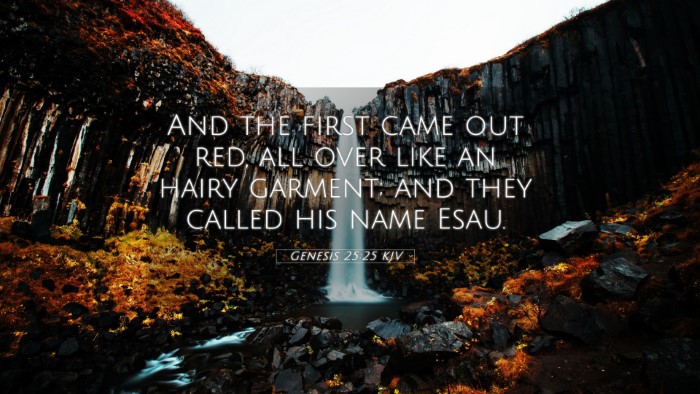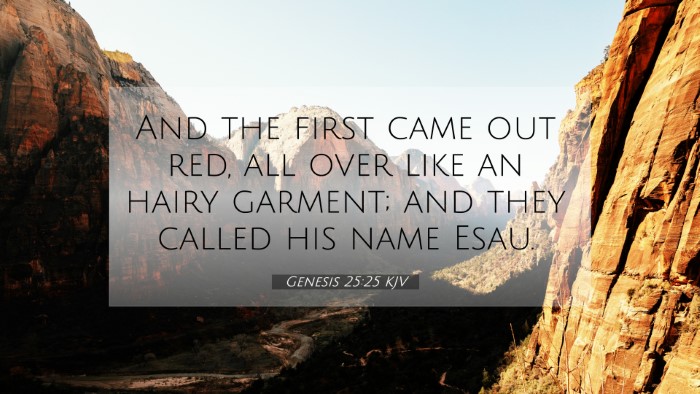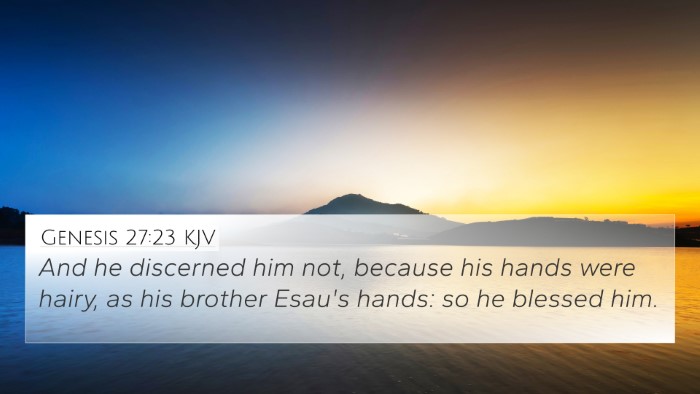Understanding Genesis 25:25
Verse: "And the first came out red, all over like a hairy garment; and they called his name Esau." (Genesis 25:25)
The verse captures the birth of Esau, the firstborn son of Isaac and Rebekah. The description given – "red, all over like a hairy garment" – foreshadows the characteristics that will define Esau's life and the enmity between him and his brother Jacob. This passage can be analyzed through different lenses, providing a deeper understanding of divine purpose, family dynamics, and prophetic significance.
Commentators' Insights
-
Matthew Henry:
Henry emphasizes the significance of the naming of Esau and suggests that the physical attributes bestowed upon him are not merely incidental but reflective of his future nature and actions. This initial description sets the stage for the struggles and conflicts that will arise between him and Jacob.
-
Albert Barnes:
Barnes notes that the peculiar physical appearance of Esau (hairiness and red color) serves to foreshadow his characteristics of being a rugged man, a hunter, and one who carries a unique role in the unfolding narrative of the patriarchs. This divergence sets the stage for the subsequent tensions related to birthrights and blessings.
-
Adam Clarke:
Clarke brings attention to the cultural implications of naming. The name "Esau" can be connected to the Hebrew word for "hairy," which indicates a direct link to his appearance. Furthermore, he discusses how the lineage of Esau plays into the larger narrative of Israel's history.
Bible Verse Cross-References
-
Genesis 25:23: "And the LORD said unto her, Two nations are in thy womb, and two manner of people shall be separated from thy bowels."
-
Genesis 27:36: "And he said, Is not he rightly named Jacob? For he hath supplanted me these two times: he took away my birthright; and, behold, now he hath taken away my blessing."
-
Hebrews 12:16-17: "Lest there be any fornicator, or profane person, as Esau, who for one morsel of meat sold his birthright."
-
Malachi 1:2-3: "I have loved you, saith the LORD. Yet ye say, Wherein hast thou loved us? Was not Esau Jacob's brother? saith the LORD: yet I loved Jacob, and I hated Esau..."
-
Romans 9:13: "As it is written, Jacob have I loved, but Esau have I hated."
-
Genesis 36:1-2: "Now these are the generations of Esau, who is Edom. Esau took his wives of the daughters of Canaan..."
-
Ezekiel 35:1-2: "Moreover the word of the LORD came unto me, saying, Son of man, set thy face against mount Seir, and prophesy against it."
-
Luke 3:36: "Which was the son of Cainan, which was the son of Arphaxad, which was the son of Shem, which was the son of Noah, which was the son of Lamech, which was the son of Methuselah, which was the son of Enoch, which was the son of Jared, which was the son of Mahalaleel, which was the son of Cainan, which was the son of Enos, which was the son of Seth, which was the son of Adam, which was the son of God."
Connections Between Bible Verses
Genesis 25:25 is a pivotal verse, initiating the complex relationship between Jacob and Esau. By understanding this verse, we can draw thematic connections to broader narratives involving family strife, the implications of divine choice, and the unfolding of God's covenant promises. This verse exemplifies how linking Bible scriptures enriches our understanding of Scripture.
Thematic Bible Verse Connections
Several key themes emerge from Genesis 25:25 and its cross-references, including:
- The nature of birthright and blessing - as seen in the later conflicts between Jacob and Esau.
- Divine sovereignty versus human choices, where each brother's life choices illustrate broader theological points.
- Familial discord, which is a recurring theme throughout the Bible, highlighted by the rivalry between Jacob and Esau.
Cross-Referencing Biblical Texts
Using a Bible concordance or cross-reference guide, one can explore the intricate ties between Genesis 25:25 and other related verses. This practice deepens one's understanding of the narratives, themes, and theological constructs within Scripture.
How to Use Bible Cross-References
When studying Genesis 25:25, consider:
- Identifying parallel passages that speak of sibling rivalry.
- Exploring the Old Testament prophecies about the descendants of Esau and Jacob.
- Analyzing connections with New Testament references that discuss the implications of familial lines.
Conclusion
In summary, Genesis 25:25 is much more than a simple account of birth; it carries profound implications for theology and the human experience. Through careful examination of this verse and its rich tapestry of cross-references, we uncover a deeper contextual understanding of God's purposes and human relationships.





